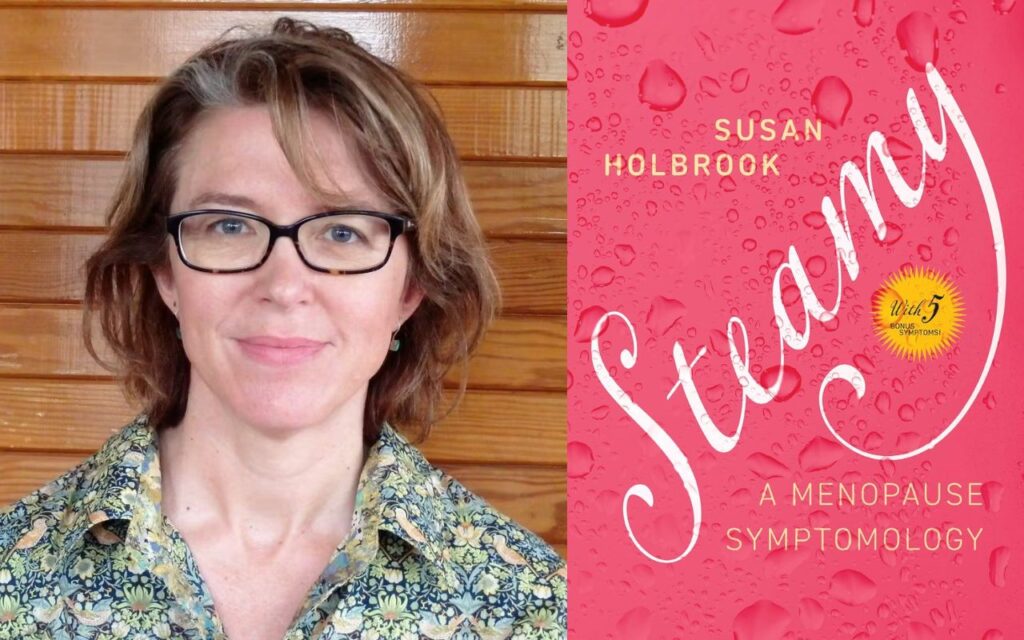
Let’s face it: menopause has long been wrapped in mystery, misinformation, and more than a little silence.
But for writer and professor Susan Holbrook, menopause isn’t something to tiptoe around. It’s a stage of life that deserves honesty, visibility – and, yes, a little humour.
In her latest book, Steamy: A Menopause Symptomology, Holbrook takes readers on a bold, funny, and deeply personal journey through the ups, downs, and outright weird moments of menopause. Organized by a “table of symptoms,” she dives into everything from memory loss to anxiety to low libido and dizzy spells.
We caught up with her to chat about what inspired her to write the book, why she leaned into comedy, and how talking (and laughing) about menopause can be a powerful act of resistance.
THT: If you had to give someone an overview of Steamy, what would you say?
Holbrook: It’s a book about menopause – but with a twist. Instead of a traditional table of contents, it has a table of symptoms. That became the book’s structure because, when I started looking for information on menopause, all I ever found were lists…15 symptoms, 30 symptoms, even 120! I found that horrifying, especially since I so often only heard about hot flashes growing up.
Many of those symptoms overlap with aging or other conditions, and often, the specific experience of menopause doesn’t get the focused attention it deserves. So, I used those symptoms as prompts – not always to write directly about menopause, but to explore different aspects of my life. For instance, I used “formication” (the sensation of bugs crawling on your skin) as a jumping-off point to write about where I live in the country and my encounters with all kinds of creatures.
The book is a real mash-up of genres, part memoir, part creative nonfiction, part comedy. It’s funny, feminist, and definitely not a medical guide, but I hope it’s an enjoyable, insightful read for everyone.
THT: How did the idea for the book come to you?
Holbrook: It really started with my own experience. It was happening to me, and it was so surprising. Honestly, menopause was a bit of a shock. I was like, what’s happening? All these things were going on that I hadn’t been warned about. And that is such a common experience.
Sure, the hot flashes started, but there were so many other things. And everyone goes through it in their own unique way. It’s not like there are just seven things that happen to everyone – it’s individual. You really have to do your own research. So, it was definitely on my mind.
THT: Was the writing process cathartic for you because it was so personal?
Holbrook: Yes, I think it was. Whenever you can express something confusing to you, it’s a little bit like taking control. It’s not something you can ever master, but at least you’re navigating, exploring, and applying words to it.
THT: How did humour become such a central part of the book?
Holbrook: My work has always gravitated toward both feminism and humour. The whole experience of menopause is also absurd and hilarious, so it just naturally lends itself to humour. It’s funny! I don’t know if I would’ve predicted that’s where my writing would go, but I’ve always leaned into humour.
And also, it’s that “catch more flies with honey” thing, especially when tackling something political. This is a feminist book, and I think comedy is a really persuasive mode.
THT: Did writing this book change your thoughts about aging, womanhood, or your own body?
Holbrook: Absolutely. One of the most eye-opening parts was doing historical research. I learned how menopause has either been completely ignored or, more recently – over the last couple hundred years – medicalized and pathologized. It was treated like this terrible illness that happens to women and pretty much leads straight to death.
Any time there’s money to be made or ideological pressure at play, these fictions get created. That was really eye-opening, and funny and sad at the same time. It enriched my understanding of how women’s bodies have been medicalized throughout history.
That definitely affected the way I wrote the book. It seeps into the writing – I mean, leeches are mentioned in the book!
THT: Speaking of leeches, did any particular chapter stand out as your favourite to write?
Holbrook: Yes! Mood Swings. I loved that one. It uses the metaphor of swinging at a park – up, down, forward, back – to describe the emotional rollercoaster. It just clicked. I felt like I was on the right track with that piece. It was really fun to write.
THT: And what was the hardest chapter to write?
Holbrook: The ones about mental health – like panic disorders and depression. I developed both, and I’m still not sure how much was menopause, how much was COVID and lockdown, or just life in general. But those were tough. You have to go back and relive those feelings in order to write about them honestly, and that’s not easy. I left those chapters until the very end.
THT: Why do you think it’s important to talk about menopause more openly like you do in the book?
Holbrook: Because it’s not a niche issue – it affects half the population! It’s not like, “Oh, society, let me tell you something.” No, we are society. We need to bring our own experiences to light and make them visible and heard. That way, women won’t be shocked, and the people in their lives won’t be shocked either.
We shouldn’t keep it in the shadows. That’s the thing: if all you know is the taboo, you feel shame.
But now that I’m past it all – I’m post-menopause – I honestly feel like I’m 10 years old again, and it’s fantastic. Like a 10-year-old, I do what I want. I don’t care what people think. I’m not burdened by surveillance or judgment. And that’s amazing.
THT: What do you hope readers take away from your story?
Holbrook: Well, I hope they make the fan that comes at the front of the book! That’s my favourite part!
I hope readers take away a sense of community from it – like we’re in this together. I hope they giggle. I hope they want to reread it. And I hope it speaks to the individuality of the experience, too. I make it clear: not everyone is going to get all of these symptoms. Some people get none, and some get way more than what’s in the book. And that’s okay! That’s life!









